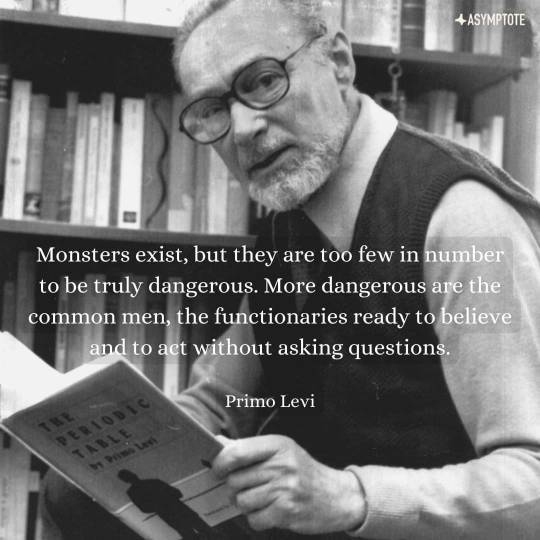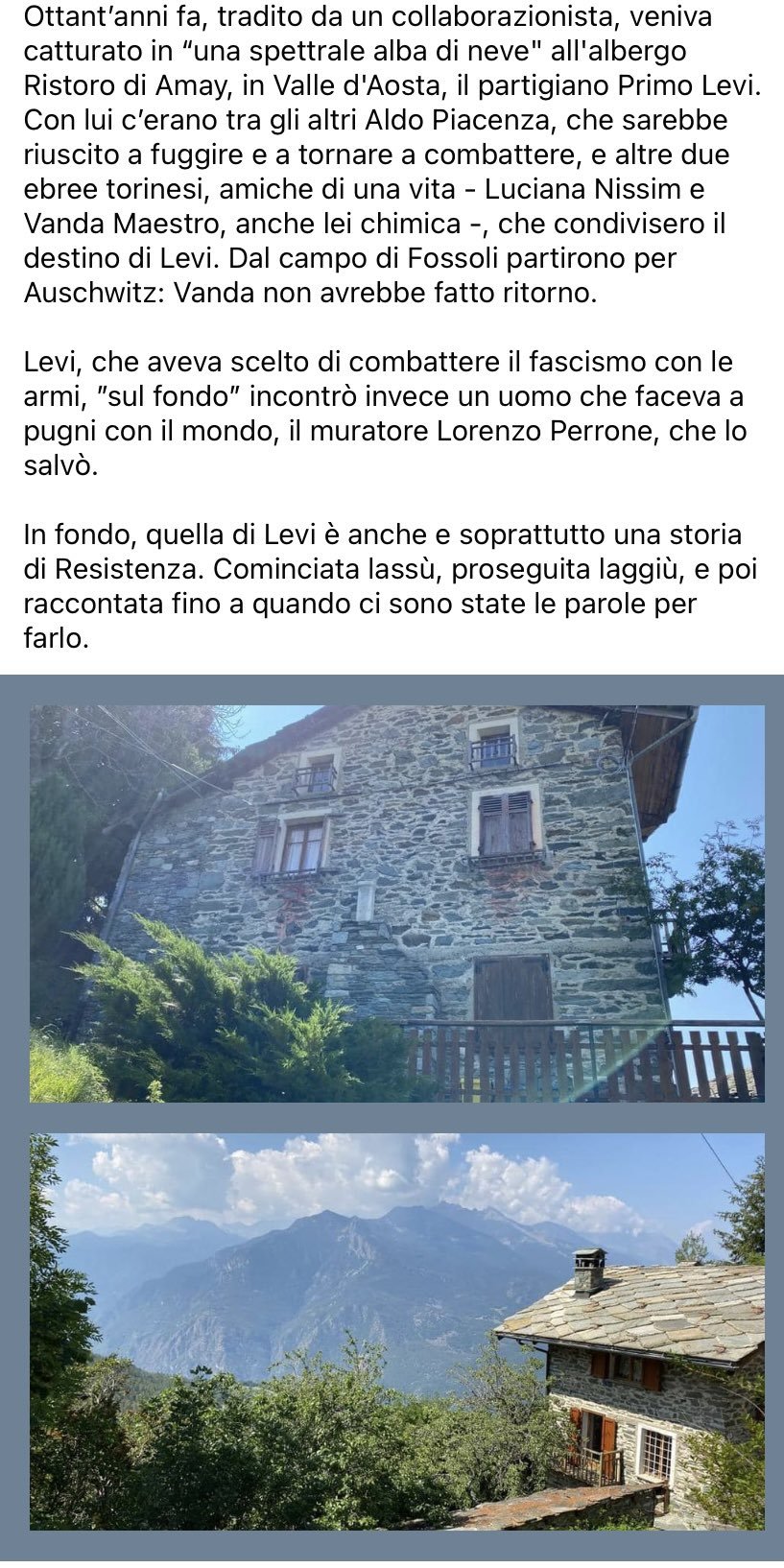#primo levi
Text

Liberation of Auschwitz
* * * *
“Auschwitz is outside of us, but it is all around us, in the air. The plague has died away, but the infection still lingers and it would be foolish to deny it. Rejection of human solidarity, obtuse and cynical indifference to the suffering of others, abdication of the intellect and of moral sense to the principle of authority, and above all, at the root of everything, a sweeping tide of cowardice, a colossal cowardice which masks “Itself as warring virtue, love of country and faith in an idea.”
From "If This Is a Man" by Primo Levi
#Auschwitz#Holocaust#Holocaust Remembrance day#remembrance#liberation of Auschwitz#quotes#Primo Levi
75 notes
·
View notes
Text

Primo Levi, (1975), Das periodische System, Afterword by Natalia Ginzburg, Translation by Edith Plackmeyer, Deutscher Taschenbuch Verlag (dtv Verlag), 1991



Cover Design: Celestino Piatti
Photograph (Primo Levi, cover): © Jerry Bauer
#graphic design#book#il sistema periodico#primo levi#natalia ginzburg#edith plackmeyer#celestino piatti#jerry bauer#deutscher taschenbuch verlag#1970s#1990s
62 notes
·
View notes
Text
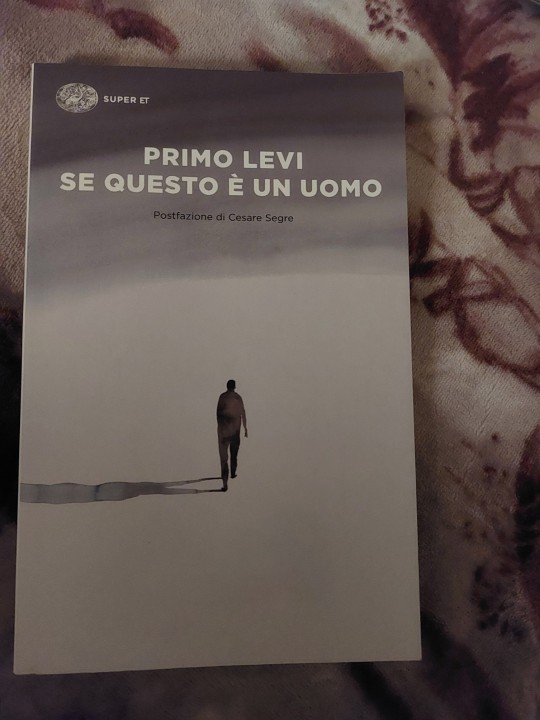
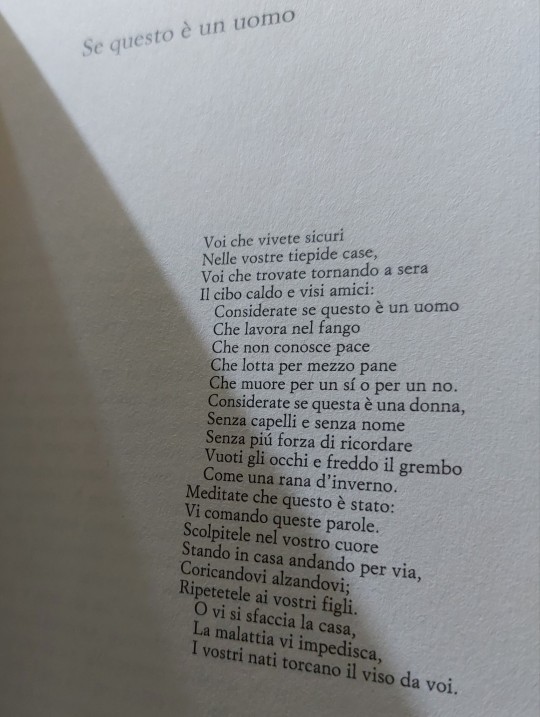

“Se comprendere è impossibile, conoscere è necessario, perché ciò che è accaduto può ritornare, le coscienze possono nuovamente essere sedotte ed oscurate: anche le nostre.”
25 notes
·
View notes
Text
"Fantasy and science fiction in their very conception offer alternatives to the reader’s present, actual world. Young people in general welcome this kind of story because in their vigour and eagerness for experience they welcome alternatives, possibilities, change. Having come to fear even the imagination of true change, many adults refuse all imaginative literature, priding themselves on seeing nothing beyond what they already know, or think they know.
Yet, as if it feared its own troubling powers, much science fiction and fantasy is timid and reactionary in its social invention, fantasy clinging to feudalism, science fiction to military and imperial hierarchy. Both usually reward their hero, whether a man or woman, only for doing outstandingly manly deeds. (I wrote this way for years myself. In The Left Hand of Darkness, my hero is genderless but his heroics are almost exclusively manly.) In science fiction particularly, one also often meets the idea I discussed above, that anyone of inferior status, if not a rebel constantly ready to seize freedom through daring and violent action, is either despicable or simply of no consequence.
In a world so morally simplified, if a slave is not Spartacus, he is nobody. This is merciless and unrealistic. Most slaves, most oppressed people, are part of a social order which, by the very terms of their oppression, they have no opportunity even to perceive as capable of being changed.
The exercise of imagination is dangerous to those who profit from the way things are because it has the power to show that the way things are is not permanent, not universal, not necessary.
Having that real though limited power to put established institutions into question, imaginative literature has also the responsibility of power. The storyteller is the truth-teller.
It is sad that so many stories that might offer a true vision settle for patriotic or religious platitude, technological miracle working, or wishful thinking, the writers not trying to imagine truth. The fashionably noir dystopia merely reverses the platitudes and uses acid instead of saccharine, while still evading engagement with human suffering and with genuine possibility. The imaginative fiction I admire presents alternatives to the status quo which not only question the ubiquity and necessity of extant institutions, but enlarge the field of social possibility and moral understanding. This may be done in as naively hopeful a tone as the first three Star Trek television series, or through such complex, sophisticated, and ambiguous constructions of thought and technique as the novels of Philip K. Dick or Carol Emshwiller; but the movement is recognizably the same – the impulse to make change imaginable.
We will not know our own injustice if we cannot imagine justice. We will not be free if we do not imagine freedom. We cannot demand that anyone try to attain justice and freedom who has not had a chance to imagine them as attainable.
I want to close and crown these inconclusive meditations with the words of a writer who never spoke anything but truth, and always spoke it quietly, Primo Levi, who lived a year in Auschwitz, and knew what injustice is.
The ascent of the privileged, not only in the Lager but in all human coexistence, is an anguishing but unfailing phenomenon: only in utopias is it absent. It is the duty of righteous men to make war on all undeserved privilege, but one must not forget that this is a war without end."
- Ursula K. Le Guin, from "A War Without End." Utopia, 2016.
#ursula k. le guin#primo levi#quote#quotations#storytelling#fantasy#science fiction#sci fi#imagination#freedom#utopia#dystopia#justice#activism#revolution#books#reading#oppression#injustice#patriarchy#privilege#capitalism
59 notes
·
View notes
Text
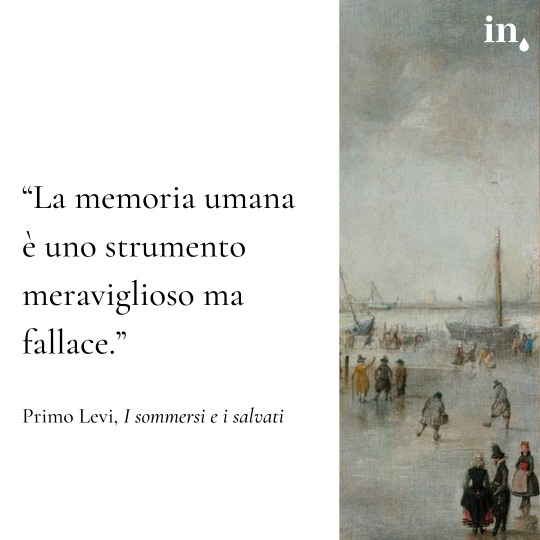
181. I sommersi e i salvati
13 notes
·
View notes
Text
“ L'eliminazione fisica dei migliori è l'inevitabile contrappasso della «perfezione» del Lager, la conseguenza necessaria di un potere veramente assoluto, ab-solutus, sciolto da ogni limite. Ma uccidere i migliori, i più coraggiosi non significa soltanto ferire a morte anche la dignità dei sopravvissuti, ogni impulso a ribellarsi, bruciare ogni residuo di resistenza al sistema del Lager. Essa produce un altro effetto perverso: la resistenza non verrà più esercitata contro il sistema, ma la sua spinta viene canalizzata in una direzione diversa, assumerà soprattutto la forma della lotta tra i prigionieri. La rottura, sistematica e preventiva, della fraternità tra i deportati fa sì che la difesa della propria dignità si rovesci nel suo contrario, nel tradimento degli altri. I rituali d'ingresso hanno anche questa funzione, quella di distruggere gli schemi della vita quotidiana e del senso comune: il mondo che il nuovo arrivato trovava era indecifrabile, completamente diverso da quello che si era atteso, ancora incentrato intorno ad una nitida linea di demarcazione e contrapposizione tra «noi» e «loro», tra i perseguitati e i persecutori. Invece ci si accorgeva subito che: «il nemico era intorno ma anche dentro, il 'noi' perdeva i suoi confini, i contendenti non erano due, non si distingueva una frontiera ma molte e confuse» [Nota: P. Levi, I sommersi e i salvati, Einaudi, Torino 1986, p. 25]. E dopo poco diventava evidente che nel campo ognuno è «il Caino di suo fratello».“
Franco Cassano, L'umiltà del male, Laterza, Roma-Bari, 2011. [Libro elettronico]
#Franco Cassano#L'umiltà del male#letture#leggere#saggi#intellettuali italiani#saggistica#scritti saggistici#totalitarismo#Storia del XX secolo#citazioni#Primo Levi#assolutismo#libri#I sommersi e i salvati#lager#sociologia#sociologi#dittature#sistema concentrazario#shoah#olocausto#genocidi#odio#Storia d'Europa del '900#persecuzioni#fanatismo#resistenza#fraternità#fratellanza
18 notes
·
View notes
Text

Occorre essere diffidenti con chi cerca di convincerci con strumenti diversi dalla ragione, ossia con i capi carismatici: dobbiamo essere cauti nel delegare ad altri il nostro giudizio e la nostra volontà. E’ meglio rinunciare alle verità rivelate, anche se ci esaltano per la loro semplicità. E’ meglio accontentarsi di altre verità più modeste e meno entusiasmanti, quelle che si conquistano faticosamente, a poco a poco, con lo studio, la discussione e il ragionamento, e che possono essere verificate e dimostrate.
24 notes
·
View notes
Text

"La memoria è un progetto per il futuro, non è volgersi nostalgicamente al passato. Il passato si onora solo se edifichiamo un futuro fondato su quei principi calpestati e denigrati per i quali innocenti sono caduti e uomini giusti hanno combattuto e sono morti. Purtroppo in questa nostra Europa ci sono segnali di pesanti regressioni [...]. Un'Europa pavida, vile che tace, che accetta tutto. [...] L'antifascismo si pensa, si pratica, lo si esercita avendo memoria e opponendosi a ogni forma di sopruso. Primo Levi ci ha lasciato un'eredità definitiva sulla questione: ciò che è stato può avvenire di nuovo perché appartiene al lato oscuro dell'umanità. [...] Dobbiamo combattere con tutte le nostre forze, la logica del privilegio, del sopruso, della disuguaglianza e la più grande pestilenza che può ammorbare una società: l'indifferenza.
Sono parole di Moni Ovadia. Risalgono al 2016.
Una delle funzioni degli intellettuali è subodorare la puzza di gas, di fogna, di bruciato o di sterco prima ancora che si diffonda lentamente nell'aria; tanto lentamente che finiamo per abituarcene. E tutto ci sembrerà NORMALE.
#memoria#27 gennaio#primo levi#indifferenti#indifferenza#fascismo#antifascismo#uomini comuni#conformismo#conformisti#soprusi#oppressione#disuguaglianza#lato oscuro#intellettuali#puzza#gas
12 notes
·
View notes
Text
“Auschwitz is outside of us, but it is all around us, in the air. The plague has died away, but the infection still lingers and it would be foolish to deny it. Rejection of human solidarity, obtuse and cynical indifference to the suffering of others, abdication of the intellect and of moral sense to the principle of authority, and above all, at the root of everything, a sweeping tide of cowardice, a colossal cowardice which masks itself as warring virtue, love of country and faith in an idea.”
From "If This Is a Man" by Primo Levi
108 notes
·
View notes
Text
Dovrei, forse, provare rabbia.
Provo, invece, vergogna.
La vergogna di essere uomo.
Primo Levi
10 notes
·
View notes
Text

#primo levi#poetry#jumblr#jewish things#for those of you who don’t know Primo Levi was a writer and a Holocaust Survivor#February 1944 is when his camp got deported to Auschwitz#and of course today is Sunday February 25#(it is also my birthday)#(I was also born on a Sunday)#in Judaism the past never ends#Baruch Dayan Ha’Emet
10 notes
·
View notes
Photo
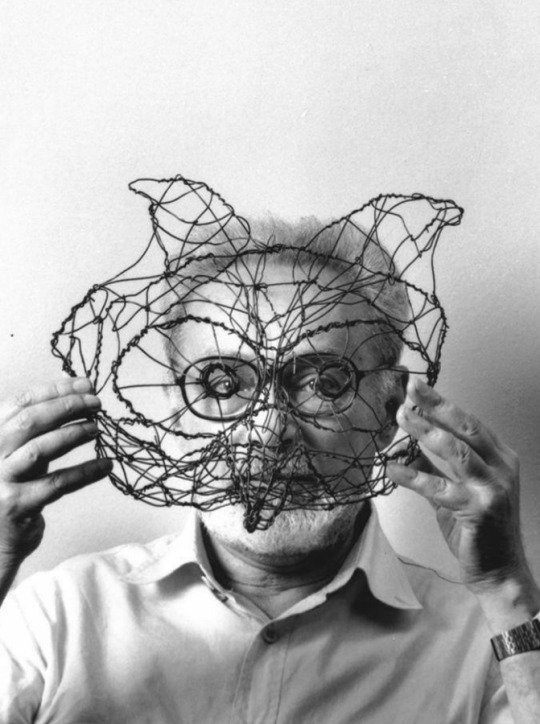
Primo Levi, July 31, 1919 / 2022
(image: Primo Levi, Photograph: © Mario Monge)
172 notes
·
View notes
Text

Era stato un ragazzo opaco ma sicuro, di cui ci si poteva fidare: e l'esperienza insegna che proprio questa, l'affidabilità, è la virtù più costante, quella che non si acquista né si perde con gli anni. Si nasce degni di fiducia, col viso aperto e gli occhi fermi, e tali si resta per la vita. Chi nasce contorto e lasco, tale rimane. Chi ti mente a sei anni, ti mente a sedici e a sessanta.
-Primo Levi -Il sistema periodico
48 notes
·
View notes
